Homeless

Vatican officials say reports that Pope Francis has been slipping out at night to visit the homeless in Rome are “simply not true,” though that hasn’t stopped the stories from capturing the public imagination.
That’s probably because such tales seem right in line with Francis’ unconventional and pastoral style. What’s more, the faithful always love it when a church leader sneaks under the radar to make a point — witness the fascination with the Mormon bishop who recently disguised himself as a panhandler and then revealed his identity when he climbed into the pulpit.
But breaking out of the “gilded cage” of the Vatican has been a dream of many popes and other churchmen who fear losing touch with their calling as pastors — or simply their connection to ordinary life.

There is a popular African proverb that says, when elephants fight, it is the grass that suffers. This proverb highlights the reality that too often while nations and powerful entities fight amongst themselves, the common people of the land suffer the most. It is a historical truth that those who make the decision to wage wars (military, legislative, or otherwise) often have the least to lose. Sure, they may lose their prestige, position, or power, but in the end their essential well-being and access to basic necessities are maintained. Sadly, the same cannot be said of many of those who are the instruments and casualties of war and political conflict.
Veterans: America’s Suffering Grass
In the United States, a large number of veterans who fought in wars at the command of the political elite have returned home from the battlefield to a life of impoverishment and fickle social services.

There is no longer a war on hunger in this country.
There is no longer a war on poverty.
There is a war on the hungry.
There is a war on the poor.
It is being waged all over the country with the most recent — and visible — battle coming from Raleigh, N.C., and the now-viral incident with the Rev. Hugh Hollowell’s Love Wins ministries.
It’s ironic, really.
Conservatives love to tell folks that the best way to end poverty, homelessness, and need in our country is through the work and generosity of private individuals and private donations, not through government programs.
The answer, they say, is charity.
Yet in a stroke of cruel hypocrisy, when charities actually address these issues in real life, they aren’t commended for their work.
Rather, they are threatened with arrest.

Our church is right in the heart of the city and as such, many who make their home outside find their way into our worship services on Sunday and throughout the week for various reasons. The first year Amy and I were here, we made a concerted effort to allow people to sleep on the steps and in the courtyard of the church if they so chose, as it seemed to be the bare minimum offering of hospitality required of us.
In the past few months, however, things have gotten a lot more complicated. Several fights have broken out over turf, a couple of people have fallen and lost teeth or broken ribs, and at least three times, people have broken into the boiler room to sleep. At least once or twice a week, we catch a group of younger folks shooting up heroin in the courtyard, their needles scattered about in the midst of the greenery. We have found every kind of bodily waste one cares to imagine in the common area, and this Sunday during our annual church cookout, I had to escort one man out of the restroom for masturbating to pornography in one of the bathroom stalls.
There comes a point when the hospitality afforded to those we are trying to welcome in has to be weighed against the safety of those already present in the community. Although the sanitation issues and the vandalism were less than pleasant, the violence, drug use, and sexual indiscretions finally pushed us over the line. We met with the Portland police and had a notice posted that said any loiterers who refused to leave upon request would be arrested.

Early morning
before he unlocks the church gate
the rector kneels before
the gridiron fence surrounding the Cathedral,
not in prayer
but to collect empty wine bottles,
snack bags, and used condoms.
After shoving them into a bag
he turns the latch key and enters the churchyard
shutting it behind him.
The hollow, thunderous deadbolt
echoes through trees like the voices of
ancient saints.
Eleven years after New York Mayor Michael Bloomberg took office, more than 50,000 people rested in homeless shelters and on the streets of New York City last night — nearly 45 percent of which were children. As numbers have reached an astonishing height within shelter population, New Yorkers are hoping the next mayor elected will provide permanent shelter and resources for families and children in need. The New York Times reports:
The next mayor will have to do better by them than Mr. Bloomberg. He once proposed energetic and aggressive initiatives on behalf of the homeless. Now he speaks of them with resentment: “You can arrive in your private jet at Kennedy Airport,” the mayor said recently, “take a private limousine and go straight to the shelter system and walk in the door and we’ve got to give you shelter.”
Read more here.
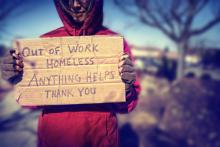
There should be no poor among you - Deuteronomy 15:4
This is one of the few commands virtually all religious people easily – even eagerly – follow.
We just do it our own way.
The biblical and cultural context and overriding assumption is that those of us with means should contribute – willingly and without conditions – to those among us who, for whatever reason, are needy.
We are not to judge – or distance ourselves – from those who have little – or cannot pay us back. In fact these are the ones Jesus commands that we – and by extension he – should invite to a banquet (Luke 14:12-14).
But we seem to have ‘no poor among us’ – we do our best to exclude, ignore, or even ban them when we do see them.
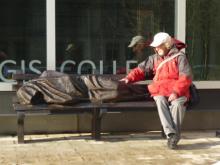
TORONTO — This homeless Jesus can barely find a home.
Canadian sculptor Timothy Schmalz notes the ironies in his latest creation, “Jesus the Homeless,” a bronze sculpture depicting the Christian savior huddled beneath a blanket on an actual-size park bench. Only the feet are visible, and their gaping nail wounds reveal the subject.
“If Jesus was watching the streets today,” Schmalz says from his home in St. Jacobs, Ontario, “I think he would want himself represented as one of the most marginalized. That’s what he said in the Gospel.”
Indeed, as Schmalz notes, Jesus calls on his followers to clothe the naked, feed the hungry, and tend to the lame. Possibly referring to himself, Jesus says, in the book of Matthew, that “the Son of Man has nowhere to lay his head.”

We have a group at our church that does a weekly sandwich ministry together. Though we already had a group that makes sandwiches each week for a local shelter, another team realized some folks don’t go to shelters, and that they might be missing out on a real opportunity to connect with different folks in our community if they didn’t go out to where the people are.
So now, every week, they walk the streets of downtown Portland and hand out upwards of 100 sandwiches. As they’ve met folks who live outside, they’ve identified other needs some have, such as socks, new underwear, rain gear, flashlights, and batteries. Each week, they come back with a list of needs, and each week our congregation helps fill those needs.
To me, this kind of ministry is exemplary of what missional church is about. We don’t simply wait behind the walls for people to come ask for something; we go out, meet people face-to-face and get to know them. Yes, we offer them a meal, but we also share stories, learn a bit of their history, and they come to know that there actually are flesh-and-blood people behind all those steeples and stone facades.
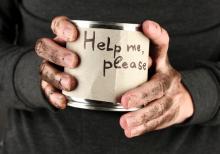
As has happened many times after I have given a talk about the Body of Christ’s responsibility to care for their brothers and sisters experiencing impoverished and dehumanizing conditions, I was asked to answerthose questions — the ones in my experience that are always the first to be asked the moment I stop speaking.
“How will I know I have given enough? How does the church balance financial responsibility with service to the poor? Where do we draw the line?”
These questions always come, sometimes spoken in a curious tone by a person whose heart is being convicted, sometimes in an angry accusing tone insinuating I must hate prosperity, sometimes privately as a whisper in my ear or in a personal email filled with insinuations about my sanity. What a preposterous proposal, that the Body of Christ in any particular location should be the first resource to its own community for spiritual, physical, and emotional well being! Don’t I know that such a mission is naïve and impossible to achieve? Most recently it was phrased like this: “I love this idea, but it is difficult to see benevolence funds go towards someone's electric bill when they smell like they smoked five packs of cigs before meeting with us; what do we do?”

During this Holy Week, Christians around the world turn inward to reflect on the mystery and miracle of the death and resurrection of our Lord, Jesus Christ. Those two surpassing events are more than good enough to occupy the mind and heart of every believer.
But they are not all that Jesus did in these eventful days. As any student of the scriptures will know, Jesus did not go quietly to the cross. Three days before his execution, he stormed the temple and challenged the seat of theocratic power in Jerusalem, condemning the pharisaic elite who "preach, but do not practice" and "tie up heavy burdens, hard to bear, and lay them on the people's shoulders." (Matt. 23:3-4) He accused as hypocrites leaders who make token offerings yet "have neglected the weightier matters of the law: justice and mercy and faithfulness … Inside they are full of greed and self-indulgence." (Matt. 23:23,25)
In his final teaching before the events of Maundy Thursday and Good Friday began, Jesus embraced those who are oppressed and cautioned his disciples that acts of love and mercy are the measure of a heart touched by grace. "For I was hungry and you gave me food, I was thirsty and you gave me drink, I was a stranger and you welcomed me, I was naked and you clothed me, I was sick and you visited me, I was in prison and you came to me … Truly, I say to you, as you did it to one of the least of these my brothers, you did it to me." (Matt. 25:35-40)
In honor of the occasion, Congress will close its doors and lawmakers will head home to be with their constituents for the Easter recess. If inside reports are to be trusted, they will leave Washington "armed with excuses" that explain away the latest fiscal fiasco, and the people will have little to say in reply. I pray it isn't so.
Christianity Today reports:
When Kimberly Banks unexpectedly lost her job in 2006 and her job search stretched from weeks to months, she became despondent. Living in a Denver motel, she would frequently wake at 3 A.M. and cry out to God in prayer as her two sons slept soundly nearby. "I was always a woman who said I can take care of my own. There were some nights that I didn't want to keep living because I felt like less than a mother, like my kids were better off somewhere else," Banks recalls. "I didn't know what to do."
But getting involved with Denver's innovative Family and Senior Homeless Initiative (FSHI) changed all of that. Banks was matched with a mentoring team from a local church. They met regularly for financial counseling, support, and encouragement. The church paid the first month's deposit on an apartment and helped her furnish it.
Read more here.
THE RED, RUN-DOWN, two-story frame house on Morris Avenue in the West Bronx that houses the Picture the Homeless offices looks much like those around it, except for the organization’s blue banner that hangs from the porch. The youths (there are older members too) who log in to their homeless blogs and look for jobs on the computers upstairs, surrounded by images of Zapata and the Selma freedom marchers, are mainly black and Latino, and they could be almost any of the young people you see on the street. Picture the Homeless is seamlessly embedded in this New York City neighborhood, where the new poor from Africa and South Asia join the long-established poor from Puerto Rico and the Dominican Republic.
Picture the Homeless (PTH) combines social action, advocacy, outreach, and community and is run almost exclusively by homeless and formerly homeless New Yorkers. The organization’s name references the importance of challenging widespread stereotypes about people who are homeless. “Don’t talk about us; talk with us” is a PTH slogan, and it claims as a founding principle that “in order to end homelessness, people who are homeless must become an organized, effective voice for systemic change.”
Kendall Jackman, in her 50s, one of PTH’s housing organizers, lives in a women’s shelter not far from Morris Avenue. The former postal worker from Brooklyn’s Bed-Stuy neighborhood—“No matter where I live, I will always be a Bed-Stuy girl,” she said—lost her housing two years ago when the building she was living in was foreclosed on.
“Of the 72 women in my shelter, 69 of us either work or go to school,” Jackman said. “With no low-income housing available, shelters are now the homes of the working poor.”
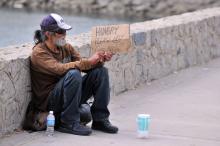
A growing number of cities across the United States are making it harder to be homeless.
Philadelphia recently banned outdoor feeding of people in city parks. Denver has begun enforcing a ban on eating and sleeping on property without permission. And this month, lawmakers in Ashland, Ore., will consider strengthening the town's ban on camping and making noise in public.
And the list goes on: Atlanta, Phoenix, San Diego, Los Angeles, Miami, Oklahoma City and more than 50 other cities have previously adopted some kind of anti-camping or anti-food-sharing laws, according to the National Law Center on Homelessness & Poverty.

I want to tell you the story of one brave woman who has given her life to live in the East Garfield Park neighborhood of Chicago.
Arloa Sutter is one of my new heroes. Let me tell you why.
I met Arloa through the Redbud Writers Guild to which we both belong. Last month I had the honor of meeting her at our guild retreat. I had no idea what a culture rebel she was.
Arloa didn't begin her days of serving the inner-city poor as the grandmother she is today, but as a young woman. It all began with her church staff not knowing what to do with the many people who came into the building during the week needing assistance. Instead of pushing them out the door, she created a storefront room that provided food,l friendly conversation and a hot cup of coffee to those wishing to escape the cold. This eventually evolved into her gathering a board of directors to form Breakthrough Ministries in 1992.
She didn’t know what she was doing, but she did it anyways. I love gutsy people like that.

Emmanuel shows up on our front porch about once a week. His name means “God with us,” but if there’s anyone on the planet who appears to have been forgotten by the Divine, It’s him. He stands at about 5’4″ and has maybe a handful of teeth left. when he speaks, I catch about half of what he says, but there’s a childish innocence in his eyes that betrays the years of hard living he has endured since then.
Sometimes he offers to do work; sometimes he asks for food. Usually he just wants money. I’ve written before about my struggles with this, as the controlling side of me wants to have a hand in how he spends “my” money. This particular day, he’s looking for fifteen dollars for rent.
“I told you you had to get clean before I’d give you any money man,” I shook my head. “I can give you some food.”
“I’m clean, sir, I’m clean,” he always calls me that, even though he’s nine years older than I am. He was speaking more clearly than usual and his eyes were unusually bright. “Come with me sir. If you’ll drive me to the Catholic Woman’s house, she’ll tell you I’m clean.”
A new charity project debuting at the South by Southwest (SXSW) festival in Austin, Texas, is sparking controversy.
BBH Labs, a non-profit in New York, has started a campaign called “Homeless Hotspots,” in which homeless people are equipped with the tools to act as portable hot spots for nearby people seeking 4G access.
Here’s how it works: The homeless person wears a t-shirt with the words “I’m a 4G Hotspot” written across the chest, accompanied with an SMS code and key number. Inquiring minds plug the information into their phones or tablets, give a donation via Paypal, and are given access to their service. Every dollar goes directly to the person providing you access, with a suggested donation of $2 for every 15 minutes.
But is this really a charity?

I’d like to think I’m pretty consistent in my advocacy for the poor. I have worked with numerous poverty-related nonprofits over the years, preached about it and worked on it in church, written about it, and so on. But in general, all of that remains at a large “macro” level. It is a nameless, faceless group known broadly as “the poor,” or worse, it simply becomes an issue.
Sometimes making it more real than that is emotionally overwhelming, if not paralyzing. When I worked in Fort Worth at an AIDS housing facility, seeing the multiple challenges first-hand that some of our residents faced was heartbreaking. In some cases it seemed they had little, if anything, on which to hang a shred of hope. At the Pueblo nonprofit I work with now, we have to turn away more than one thousand people a month when we run out of emergency assistance.
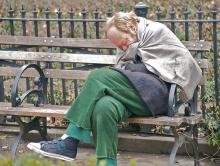
There are times when a story in the news just makes one stop with a righteous indignation.The news I heard today that one in two Americans is now classified as poor makes me angry.
This means half of the people living the richest nation in the world are poor. Is this the American exceptionalism we want?
I am angry because this is a not necessary. I am angry that so many people are suffering, while our elected officials are playing games, unable or unwilling to do what is necessary to promote the general welfare of the nation.

Social Muddle: Business, Justice, and the Gospel are Already Social; Obama Refers to His Christian Faith During National Tree Lighting Ceremony; Fount of Blessing, Fount of Youth: Age and the American Church; One-Third of Shelter Residents Are Newly Homeless; U.S. Unemployment Rate Falls to Lowest Level in Nearly Three Years; Gingrich Says Poor Children Have No Work Habits; For Afghan Woman, Justice Runs Into Unforgiving Wall of Custom.